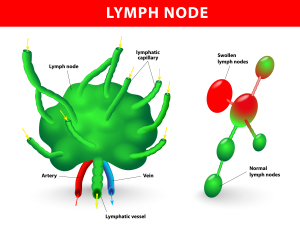If the concentration of TB bacteria is not too high, the body may be able to filter and trap them in the perihilar lymph nodes in the center of both lungs, wherethey cause lymph node tuberculosis.
However, with either higher numbers of bacteria, a weaker immune system or because of a long incubation time allowing for multiplication of the TB bacterium, the next chain of lymph glands in the upper mediastinum gets infected. These infected lymph nodes heal slowly, but often get calcified in the process, which may show up on chest X-rays. Live TB bacteria will remain placed in the center of these lymph gland granulomas.
Eventually they find their way into the thoracic duct (the main lymphatic channel in the upper right chest cavity) and from there through the blood stream into the rest of the body.
At that stage miliary tuberculosis (see point 3 above) would occur. Other complications at that stage include pericarditis, lobar TB pneumonia, and Pott’s disease (vertebral tuberculosis).
Diagnosis involves mediastinoscopy and biopsy of lymph glands as well as testing with the commercially available polymerase chain reaction, which is rapid and very specific for TB. Multi-drug antituberculous therapy against TB is then instituted and has to be continued for 9 to 12 months as otherwise recurrence rates are high.
References
1. The Merck Manual, 7th edition, by M. H. Beers et al., Whitehouse Station, N.J., 1999. Chapter 161.
2. TC Dixon et al. N Engl J Med 1999 Sep 9;341(11):815-826.
3. F Charatan BMJ 2000 Oct 21;321(7267):980.
4. The Merck Manual, 7th edition, by M. H. Beers et al., Whitehouse Station, N.J., 1999. Chapter 43.
5. JR Zunt and CM Marra Neurol Clinics Vol.17, No.4,1999: 675-689.
6. The Merck Manual, 7th edition, by M. H. Beers et al., Whitehouse Station, N.J., 1999. Chapter 162.
7. LE Chapman : Antivir Ther 1999; 4(4): 211-19.
8. HW Cho: Vaccine 1999 Jun 4; 17(20-21): 2569-2575.
9. DO Freedman et al. Med Clinics N. Amer. Vol.83, No 4 (July 1999): 865-883.
10. SP Fisher-Hoch et al. J Virol 2000 Aug; 74(15): 6777-6783.
11. Mandell: Principles and Practice of Infectious Diseases, 5th ed., © 2000 Churchill Livingstone, Inc.
12. Goldman: Cecil Textbook of Medicine, 21st ed., Copyright © 2000 W. B. Saunders Company
13. PE Sax: Infect DisClinics of N America Vol.15, No 2 (June 2001): 433-455.
14. Ferri: Ferri’s Clinical Advisor: Instant Diagnosis and Treatment, 2004 ed., Copyright © 2004 Mosby, Inc.
15. Rakel: Conn’s Current Therapy 2004, 56th ed., Copyright © 2004 Elsevier







